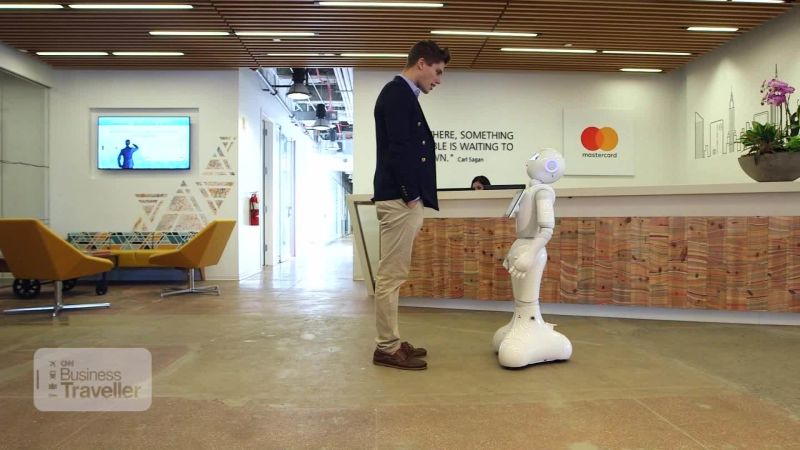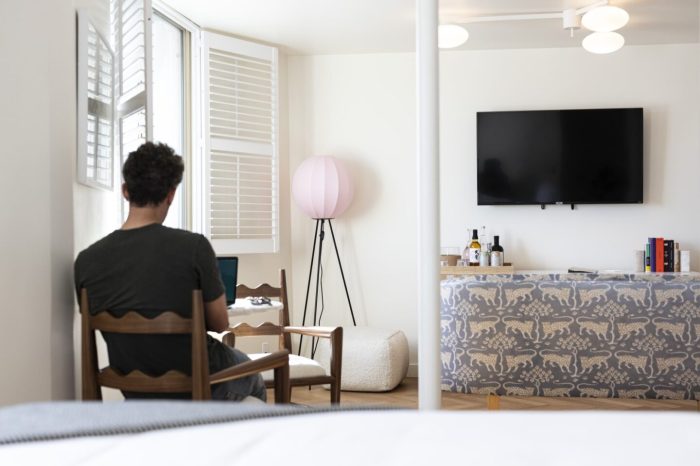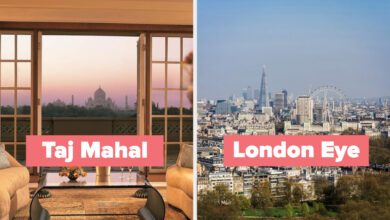Best Urban Hotels For Digital Nomads
Best Urban Hotels for Digital Nomads sets the stage for this enthralling narrative, offering readers a glimpse into a story that is rich in detail and brimming with originality from the outset. In an increasingly interconnected world, digital nomads seek urban hotels that not only provide a comfortable stay but also cater to their unique work needs. These hotels are more than just a place to rest; they are vibrant spaces designed with remote workers in mind, offering essential amenities, a sense of community, and prime locations that keep you in the heart of the action.
Exploring the ideal urban hotel can be a game changer for those balancing work and travel. From high-speed internet to cozy co-working spaces, the right environment can enhance productivity. This guide dives into the essential features, top hotel recommendations in major cities, and insider tips that help digital nomads select the perfect home away from home.
Overview of Urban Hotels for Digital Nomads
Digital nomads have unique needs that influence their choice of urban hotels. These travelers prioritize flexibility, connectivity, and comfort, seeking accommodations that facilitate both work and leisure. A successful urban hotel for digital nomads isn’t just about a bed to sleep in; it’s about creating an environment that nurtures productivity while offering the excitement of city living.When selecting urban hotels, digital nomads look for specific features that enhance their ability to work remotely.
Key elements include robust Wi-Fi connections, quiet workspaces, communal areas for networking, and proximity to local attractions or transport links. These features not only enhance the working experience but also allow nomads to immerse themselves in the local culture during their downtime.
Key Features for Remote Work
Several significant aspects contribute to making an urban hotel suitable for digital nomads. Understanding these features helps hotel operators cater to this growing demographic.
- High-Speed Internet: Reliable internet is non-negotiable for digital nomads, as it is essential for remote work, video calls, and maintaining communication with clients and colleagues.
- Dedicated Workspaces: This includes not only in-room desks but also co-working spaces or lounges designed for productivity, allowing guests to work comfortably and efficiently.
- Flexible Check-In/Out Policies: Many digital nomads travel across time zones, so flexibility in check-in and check-out times can significantly enhance their experience.
- Access to Technology: Hotels that provide printing services, charging stations, and conference rooms are particularly appealing to business travelers.
- Recreational Amenities: Access to gyms, swimming pools, and social areas helps nomads maintain their wellness while traveling, which is crucial for long-term productivity.
The significance of location in urban hotel selection cannot be overstated. Proximity to public transport, cafes, and cultural hotspots not only influences the work-life balance of digital nomads but also enhances their overall experience. By choosing hotels in vibrant neighborhoods, these travelers can easily explore the local scene after hours, making their stay both productive and enjoyable.
Top Urban Hotels in Major Cities

Source: cnn.com
Finding the perfect urban hotel as a digital nomad is crucial for maximizing productivity while enjoying the vibrant atmosphere of a city. Major cities like Berlin, New York, and Tokyo offer a plethora of options that cater specifically to the needs of remote workers. These hotels not only provide comfortable accommodations but also equip guests with the necessary amenities to ensure a seamless working experience.In this segment, we’ll explore some of the best urban hotels in these iconic cities, highlighting their work-friendly features and unique offerings that draw in digital nomads looking for a perfect blend of productivity and leisure.
Berlin
Berlin is known for its dynamic culture and rich history, making it an ideal spot for digital nomads. Here are some top picks:
- 25hours Hotel Bikini Berlin: This hotel features a rooftop terrace with stunning views of the Berlin Zoo and the city. The lobby hosts co-working spaces with free Wi-Fi, while the rooms are designed with a modern, eclectic aesthetic that inspires creativity.
- The Student Hotel Berlin: Aside from its hip design, this hotel offers spacious common areas and a dedicated co-working space. The vibrant atmosphere encourages networking among guests who are also digital nomads.
- Radisson Blu Hotel, Berlin: Known for its iconic aquarium, this hotel provides high-speed internet and comfortable workspaces in rooms. The central location allows easy access to cafes and co-working spaces.
New York
New York City is the ultimate urban hub for entrepreneurs and creatives alike. Below are some hotels tailored for the digital nomad lifestyle:
- CitizenM New York Times Square: With its stylish, modern rooms, this hotel offers self-service workspaces in the lobby equipped with charging stations and free Wi-Fi. It also features a 24/7 canteen for snacks and coffee.
- WeWork, Columbus Circle: More than just a hotel, this location offers all the amenities of a co-working space alongside stylish accommodations. Guests can easily transition from their room to productive workspaces.
- The NoMad Hotel: Combining elegance with functionality, this hotel boasts opulent designs and comfortable work environments. Guests can enjoy the hotel’s library for quieter work hours and a café serving excellent coffee.
Tokyo
Tokyo offers a unique blend of tradition and technology, making it an attractive city for remote workers. Check out these hotels:
- Shinjuku Granbell Hotel: This stylish hotel features a rooftop bar that provides a stunning view of the Tokyo skyline, ideal for post-work relaxation. The rooms are equipped with high-speed internet, making it easy to get work done.
- Park Hotel Tokyo: Located in the heart of the city, this hotel offers artistic rooms designed by local artists. It has a dedicated business center and peaceful workspaces, perfect for focused tasks.
- Hotel Niwa Tokyo: Combining traditional Japanese aesthetics with modern comforts, this hotel offers tranquil garden views and cozy workspaces. The atmosphere is designed to inspire creativity and productivity.
The right hotel can significantly enhance a digital nomad’s experience, making it essential to choose accommodations that align with both work and lifestyle needs.
Essential Amenities for Digital Nomads

Source: cabbi.com
In the evolving world of remote work, digital nomads seek urban hotels that cater to their specific needs. Essential amenities can significantly enhance productivity and comfort, making a hotel feel like a home office away from home. Urban hotels that provide the right facilities can attract long-stay guests who prioritize work-life balance while exploring new cities.Digital nomads require a variety of amenities to facilitate their work and leisure needs efficiently.
High-speed internet is non-negotiable, enabling seamless connectivity for video calls, downloads, and research. Beyond that, co-working spaces offer an environment conducive to collaboration and networking. Additionally, access to kitchen facilities is vital for those who prefer to cook their meals rather than dine out frequently. Hotels that recognize and cater to these requirements can greatly enhance the experience for digital nomads.
Comparison of Hotel Amenities
When evaluating urban hotels, understanding the specific amenities offered can help digital nomads make informed decisions about where to stay. Below is a comparison table highlighting essential amenities that cater to remote workers:
| Hotel Name | High-Speed Internet | Co-Working Space | Kitchen Facilities | On-Site Gym | Laundry Services |
|---|---|---|---|---|---|
| Urban Oasis Hotel | Yes | Shared & Private | Available | Yes | Self-Service |
| Nomad Nest | Yes | Dedicated | Full Kitchen | No | Available |
| City Work&Stay | Yes | Shared | Microwave & Fridge | Yes | Self-Service |
| The Remote Hub | No | Shared | Available | No | Available |
This comparison provides valuable insights into which hotels can accommodate the diverse needs of digital nomads. For instance, while Urban Oasis Hotel offers both shared and private co-working spaces along with high-speed internet, Nomad Nest stands out with a dedicated co-working area and full kitchen facilities, making it ideal for longer stays. In contrast, The Remote Hub lacks high-speed internet, which may deter those who rely heavily on a reliable connection.
“The right amenities can transform a hotel into a productive workspace, making it essential for digital nomads to evaluate their options carefully.”
Community and Networking Opportunities
Urban hotels are not just a place to stay; they become vibrant hubs for digital nomads looking to connect, collaborate, and create. With the rise of remote work, many urban hotels have tailored their offerings to foster a sense of community among guests. This unique atmosphere allows like-minded individuals to share ideas, collaborate on projects, and build lasting relationships while exploring new cities.The design of these hotels often includes communal spaces and frequent events, which serve as the backbone of the networking opportunities available.
From coworking areas to lounges, these spaces promote interaction among guests who are often in similar life stages or professions. By hosting events and workshops, urban hotels transform into a melting pot of cultures and expertise, making it easier for digital nomads to expand their professional networks.
Events and Workshops Hosted by Hotels
Many urban hotels actively organize events that cater to the needs of digital nomads, providing platforms for learning and networking. These events range from casual meetups to structured workshops, allowing guests to engage in meaningful exchanges. Common types of events include:
- Networking Nights: Regularly scheduled gatherings where guests can share experiences and make valuable connections over drinks or appetizers.
- Skill-Sharing Workshops: Sessions led by guests or local experts, focusing on digital skills, marketing strategies, or even personal development topics.
- Wellness Activities: Yoga classes or meditation sessions that not only promote well-being but also encourage networking in a relaxed environment.
These events often lead to collaborations on projects or even partnerships that extend beyond the duration of the hotel stay.
Importance of Social Spaces in Hotels
Social spaces within urban hotels play a crucial role in fostering collaboration and community. These areas are designed to break the ice among guests, making it easier for digital nomads to engage with one another. Key features of these social spaces include:
- Co-Working Areas: Equipped with high-speed internet and power outlets, these shared workspaces facilitate productivity while encouraging interactions among users.
- Lounges and Cafes: Relaxed environments where guests can grab a coffee and strike up conversations, often leading to spontaneous brainstorming sessions.
- Event Spaces: Versatile venues within hotels that can be adapted for various gatherings, from formal conferences to informal social events.
The atmosphere created by these spaces not only enhances the guest experience but also significantly contributes to the professional growth of digital nomads, making urban hotels a vital component of their lifestyle.
Cost Considerations for Digital Nomads
Staying in urban hotels can be an exciting yet financially challenging aspect of being a digital nomad. Understanding the costs associated with urban accommodations is crucial for managing your budget effectively. This section dives into the average expenses, budget-friendly options, and strategies for saving money while enjoying your nomadic lifestyle.
Average Costs of Urban Hotels
The cost of urban hotels varies significantly based on location, quality, and amenities. On average, a mid-range hotel in a major city may charge anywhere from $100 to $250 per night. In more upscale areas or during peak travel seasons, prices can soar above $300 a night. In high-demand cities like New York, San Francisco, or London, the average hotel price can be even higher, sometimes reaching $400 or more.
It’s essential to consider additional fees such as taxes, resort fees, and potential extra charges for amenities like high-speed internet, which is particularly important for digital nomads.
Budget-Friendly Options and Strategies
For digital nomads looking to stretch their budgets, there are several strategies to consider. Here are some effective ways to find budget-friendly urban hotel options:
- Book in advance: Securing your stay several weeks or even months ahead can often yield better rates.
- Use price comparison websites: Platforms like Booking.com or Agoda allow you to compare prices across multiple hotels.
- Consider off-peak travel: Visiting tourist-heavy cities during shoulder seasons can significantly decrease accommodation costs.
- Look for discounts: Many hotels offer discounts for long stays, so inquiring about weekly or monthly rates can lead to savings.
- Join loyalty programs: Frequent travelers can benefit from hotel loyalty programs that provide discounts, free nights, or upgrades.
These strategies not only help in cutting costs but also enhance the overall nomadic experience by allowing more funds for exploration and leisure.
Price Comparison of Urban Hotels
To provide a clearer perspective on the price ranges of urban hotels aimed at digital nomads, here’s a comparison table highlighting different hotel categories and their average nightly rates:
| Hotel Category | Average Nightly Rate (USD) | Typical Amenities |
|---|---|---|
| Budget Hotels | $50 – $100 | Basic Wi-Fi, shared bathrooms |
| Mid-Range Hotels | $100 – $250 | Free Wi-Fi, breakfast options, fitness center |
| Luxury Hotels | $250 – $500+ | High-speed internet, room service, coworking spaces |
Understanding these price ranges helps digital nomads make informed decisions that fit their financial plans while ensuring a comfortable and productive stay in urban environments.
Being mindful of your accommodation expenses can greatly enhance your traveling experience as a digital nomad, allowing you to invest more in adventures and connections.
Tips for Choosing the Right Urban Hotel
Selecting the perfect urban hotel can significantly impact a digital nomad’s productivity and overall experience in a new city. While personal preferences play a role, there are key criteria that should guide the decision-making process. Understanding these elements ensures that the chosen accommodation provides not only comfort but also a conducive environment for remote work.When evaluating an urban hotel, digital nomads should consider aspects such as location, amenities, and the overall atmosphere of the property.
The following set of questions can help gauge a hotel’s suitability for remote work and leisure.
Evaluation Questions for Hotel Suitability
These questions will help determine if a hotel aligns with the needs of a digital nomad. A careful consideration of each can enhance the selection process.
- Is the hotel located in a vibrant area with access to coworking spaces, cafes, and essential services?
- Does the hotel offer reliable, high-speed internet access throughout the premises?
- Are there designated workspaces or quiet areas conducive to focused work?
- What are the options for dining and grocery shopping nearby?
- Does the hotel provide amenities such as laundry services, gym facilities, and business centers?
- Are there social events or opportunities for networking with other guests?
- What are the cancellation policies and flexibility regarding booking changes?
A checklist can also serve as a practical tool for digital nomads during their hotel selection process, ensuring that all critical aspects are addressed.
Hotel Selection Checklist
Utilizing a checklist can streamline the decision-making process and make it easier to compare different options. Here’s a comprehensive list to consider:
- Location: Proximity to coworking spaces, cafes, and public transport.
- Internet: Availability of high-speed Wi-Fi in rooms and common areas.
- Workspace: Presence of comfortable workspaces within the hotel.
- Amenities: Access to fitness centers, laundry services, and dining options.
- Networking: Opportunities for socializing or attending events with other guests.
- Budget: Cost of accommodation and additional fees for services.
- Reviews: Feedback from previous guests about their experiences.
By utilizing these evaluation questions and the checklist, digital nomads can make informed decisions that align with their lifestyle and work needs while ensuring a fulfilling stay in urban environments.
Case Studies
Digital nomadism has gained popularity in recent years, and many individuals have successfully embraced this lifestyle, finding ways to balance work and travel from urban hotels. This section showcases inspiring stories of digital nomads who have thrived while working remotely, detailing their experiences, challenges, and the influence of their chosen hotels on their journey.One common theme among successful digital nomads is the importance of selecting the right environment to foster productivity while enjoying the perks of city life.
The chosen hotels often provide essential amenities, a vibrant atmosphere, and opportunities for networking, significantly impacting their work-life balance.
Individual Stories of Success
These case studies highlight key individuals who have effectively managed their work from urban hotels:
-
“The key to my success has been finding a hotel that feels like a second home. It’s crucial to have a reliable workspace that fuels my creativity.” – Emily, a freelance graphic designer.
Emily’s journey took her from a small town in Canada to the bustling streets of Barcelona. She chose a hotel known for its artistic vibe and reliable Wi-Fi. The hotel’s common areas served as informal meeting spots where she could brainstorm with fellow creatives, transforming her work experience into an enriching social endeavor.
-
“Living in a central location allows me to explore local culture during my downtime. It keeps me inspired and motivated.” – Jake, a travel blogger.
Jake settled into an urban hotel in Bangkok, where he found a community of like-minded travelers. The hotel organized weekly events, including local food tours and networking nights, enabling Jake to exchange ideas with other professionals and expand his blogging horizons.
-
“I struggled initially with staying focused, but my hotel’s amenities helped me create a routine that works.” – Priya, a software developer.
Priya’s experience at a hotel in Lisbon highlighted the importance of reliable facilities. The presence of a quiet work lounge, high-speed internet, and a fitness center allowed her to maintain a healthy work-life balance, ultimately boosting her productivity.
These stories demonstrate the diverse environments and communities that urban hotels can foster, supporting the unique needs of digital nomads. The experiences also emphasize the necessity of having a well-rounded routine that incorporates both work and leisure, illustrating that the right hotel choice can contribute significantly to a nomad’s happiness and success.
Future Trends in Urban Hotels for Digital Nomads
As the landscape of work continues to evolve, urban hotels are increasingly adapting to meet the needs of digital nomads. These remote workers are seeking more than just a place to stay; they are looking for environments that inspire productivity and creativity while offering the comforts of home. The hospitality industry is responding with emerging trends and innovative concepts designed specifically for this growing demographic.One of the significant trends is the rise of hybrid hotel designs that seamlessly blend work and leisure spaces.
Many urban hotels are transforming their traditional layouts to include co-working areas, meeting rooms, and private pods equipped with high-speed internet and ergonomic furniture. This not only caters to the needs of digital nomads but also enhances the appeal of the hotel to a broader audience.
Innovative Hotel Concepts Supporting Remote Work
Several innovative concepts are being introduced into the urban hotel sector, aimed at creating ideal environments for remote workers. These include:
- Co-Working Hotel Models: Some hotels are offering dedicated co-working spaces that are accessible to both guests and local professionals. These spaces often include amenities like printing services, conference rooms, and networking events.
- Flexible Room Designs: Hotels are adapting room designs to be multifunctional, allowing guests to transform their spaces from a sleeping area to an office. Features like foldable desks, extra charging stations, and soundproofing are becoming standard.
- Wellness-Focused Amenities: Recognizing the importance of mental and physical well-being for remote workers, hotels are introducing wellness programs. Yoga classes, meditation spaces, and fitness facilities are becoming common, promoting a balanced lifestyle.
- Tech-Enhanced Experiences: Advanced technologies, such as smart room controls and AI concierge services, are being integrated into hotel operations, making the stay more personalized and efficient for digital nomads.
Emerging trends indicate that urban hotels will further evolve to cater to digital nomads through the following expected developments:
Expected Developments in Urban Hotel Services
As the demand for urban hotels tailored for digital nomads grows, several key developments are anticipated:
- Increased focus on sustainability, with hotels adopting eco-friendly practices that resonate with the values of conscious travelers.
- Expansion of loyalty programs that reward long-term stays, appealing to digital nomads who work remotely for extended periods.
- Integration of online communities and social platforms, allowing guests to connect and collaborate during their stay.
- Enhanced digital infrastructure, ensuring hotels provide reliable and fast internet connectivity, a non-negotiable for remote workers.
- Partnerships with local businesses for discounts on services such as gym memberships, cafés, and local attractions, enhancing the overall experience for guests.
In this dynamic landscape, urban hotels are not just places to rest; they are evolving into vibrant ecosystems that support the lifestyle of digital nomads, fostering community and collaboration while providing essential services for remote work.
Summary

Source: drkcel.com
As we wrap up this exploration of the best urban hotels for digital nomads, it’s clear that finding the right accommodation can significantly impact both work and travel experiences. Whether you prioritize a bustling atmosphere, networking opportunities, or essential amenities, the perfect hotel is out there waiting for you. By considering the insights shared here, from cost-effective options to community-building events, digital nomads can make informed choices that enhance their nomadic lifestyle and inspire their journeys ahead.
FAQ Insights
What should I look for in an urban hotel?
Look for amenities like high-speed internet, co-working spaces, kitchen facilities, and social areas that encourage networking.
Are there budget-friendly urban hotels for digital nomads?
Yes, many urban hotels offer budget-friendly options; look for those with discounts for long stays or special deals for remote workers.
Do urban hotels host events for digital nomads?
Many urban hotels organize events, workshops, and networking sessions specifically for digital nomads to foster community.
How important is the hotel’s location for digital nomads?
The location is crucial as it affects access to co-working spaces, cafes, and other amenities that are beneficial for remote work.
Can I find hotels with kitchen facilities?
Yes, many urban hotels are equipped with kitchen facilities or kitchenettes, making it easier to prepare meals during longer stays.









